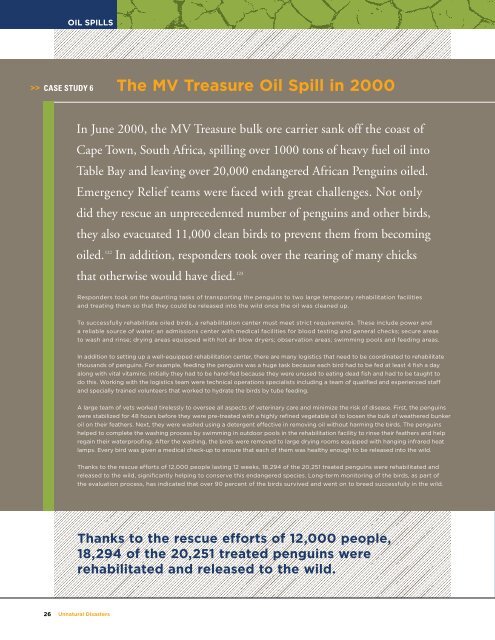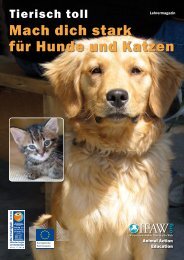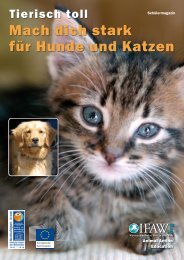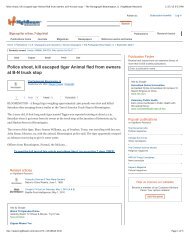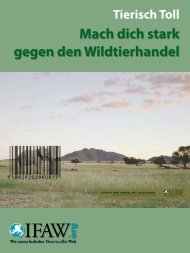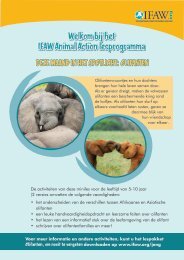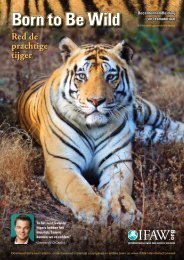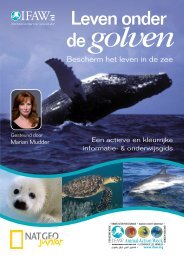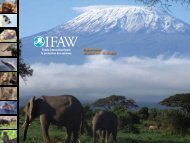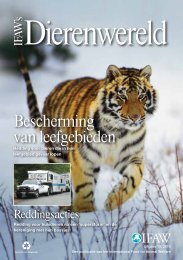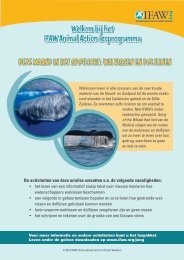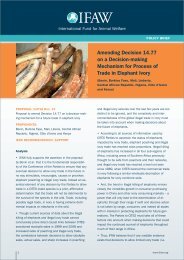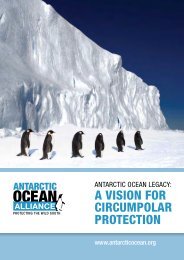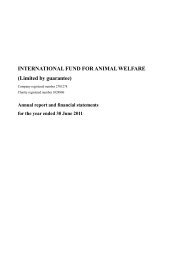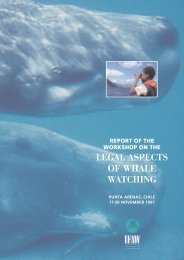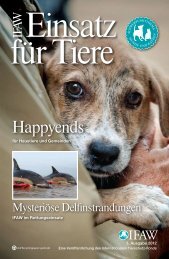Unnatural Disasters: The Impacts of Climate-related Emergencies
Unnatural Disasters: The Impacts of Climate-related Emergencies
Unnatural Disasters: The Impacts of Climate-related Emergencies
You also want an ePaper? Increase the reach of your titles
YUMPU automatically turns print PDFs into web optimized ePapers that Google loves.
oil spills<br />
case stuDy 6 the mV treasure oil spill in 2000<br />
In June 2000, the MV Treasure bulk ore carrier sank <strong>of</strong>f the coast <strong>of</strong><br />
Cape Town, South Africa, spilling over 1000 tons <strong>of</strong> heavy fuel oil into<br />
Table Bay and leaving over 20,000 endangered African Penguins oiled.<br />
Emergency Relief teams were faced with great challenges. Not only<br />
did they rescue an unprecedented number <strong>of</strong> penguins and other birds,<br />
they also evacuated 11,000 clean birds to prevent them from becoming<br />
oiled. 122 In addition, responders took over the rearing <strong>of</strong> many chicks<br />
that otherwise would have died. 123<br />
responders took on the daunting tasks <strong>of</strong> transporting the penguins to two large temporary rehabilitation facilities<br />
and treating them so that they could be released into the wild once the oil was cleaned up.<br />
To successfully rehabilitate oiled birds, a rehabilitation center must meet strict requirements. <strong>The</strong>se include power and<br />
a reliable source <strong>of</strong> water; an admissions center with medical facilities for blood testing and general checks; secure areas<br />
to wash and rinse; drying areas equipped with hot air blow dryers; observation areas; swimming pools and feeding areas.<br />
in addition to setting up a well-equipped rehabilitation center, there are many logistics that need to be coordinated to rehabilitate<br />
thousands <strong>of</strong> penguins. For example, feeding the penguins was a huge task because each bird had to be fed at least 4 fish a day<br />
along with vital vitamins. initially they had to be hand-fed because they were unused to eating dead fish and had to be taught to<br />
do this. Working with the logistics team were technical operations specialists including a team <strong>of</strong> qualified and experienced staff<br />
and specially trained volunteers that worked to hydrate the birds by tube feeding.<br />
a large team <strong>of</strong> vets worked tirelessly to oversee all aspects <strong>of</strong> veterinary care and minimize the risk <strong>of</strong> disease. First, the penguins<br />
were stabilized for 48 hours before they were pre-treated with a highly refined vegetable oil to loosen the bulk <strong>of</strong> weathered bunker<br />
oil on their feathers. next, they were washed using a detergent effective in removing oil without harming the birds. <strong>The</strong> penguins<br />
helped to complete the washing process by swimming in outdoor pools in the rehabilitation facility to rinse their feathers and help<br />
regain their waterpro<strong>of</strong>ing. after the washing, the birds were removed to large drying rooms equipped with hanging infrared heat<br />
lamps. every bird was given a medical check-up to ensure that each <strong>of</strong> them was healthy enough to be released into the wild.<br />
Thanks to the rescue efforts <strong>of</strong> 12,000 people lasting 12 weeks, 18,294 <strong>of</strong> the 20,251 treated penguins were rehabilitated and<br />
released to the wild, significantly helping to conserve this endangered species. long-term monitoring <strong>of</strong> the birds, as part <strong>of</strong><br />
the evaluation process, has indicated that over 90 percent <strong>of</strong> the birds survived and went on to breed successfully in the wild.<br />
thanks to the rescue efforts <strong>of</strong> 12,000 people,<br />
18,294 <strong>of</strong> the 20,251 treated penguins were<br />
rehabilitated and released to the wild.<br />
costs/DonatIons <strong>of</strong> the mV treasure oIleD WIlDlIfe relIef efforts *<br />
expenses cost<br />
supplIes/equIpment $24,000<br />
meDIa $42,000<br />
traVel anD expenses $132,000<br />
In-KInD DonatIons $200,000<br />
Wages paID to IfaW staff, consultants,<br />
anD temporary/contract assIstance $350,000<br />
total cost <strong>of</strong> effort $748,000<br />
Efforts to Prevent Future Oil Spills<br />
IFAW has also played an active role in achieving preventative<br />
measures to help ensure that similar catastrophes do not occur.<br />
Immediately following the MV Treasure oil spill, IFAW initiated<br />
research and efforts that led to the proposal and adoption<br />
<strong>of</strong> the decision to declare the South African coastline a Special<br />
Area. 124 In 2006, the international shipping community<br />
agreed to a designation <strong>of</strong> the Southern South Africa Sea area<br />
prohibiting or severely restricting the dumping <strong>of</strong> oily waste in<br />
that area. 125 Implemented in 2008, the designation as a Special<br />
Area status signifies reduced chronic or acute oil pollution<br />
from passing vessels as ships are restricted or prohibited from<br />
releasing oil waste discharges. In addition, illegal discharges<br />
<strong>of</strong> oil are deterred by highlighting the protected area status<br />
on international navigation charts.<br />
ifaW has also played an active<br />
role in achieving preventative<br />
measures to help ensure<br />
catastrophes do not occur.<br />
* <strong>The</strong>se figures are approximated<br />
and are only those associated<br />
with the direct costs <strong>of</strong> the<br />
international Fund for animal<br />
Welfare’s (iFaW) international<br />
relief efforts. Other groups<br />
responded in support and they<br />
may have additional figures not<br />
covered by iFaW.<br />
26 <strong>Unnatural</strong> <strong>Disasters</strong><br />
International Fund for Animal Welfare 27<br />
© IFAW/j. RoDRIGUez


